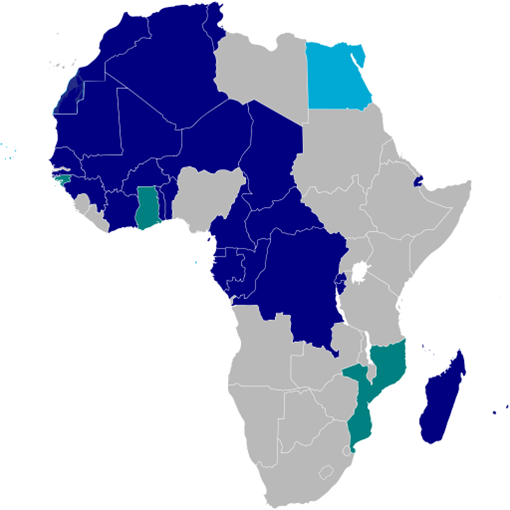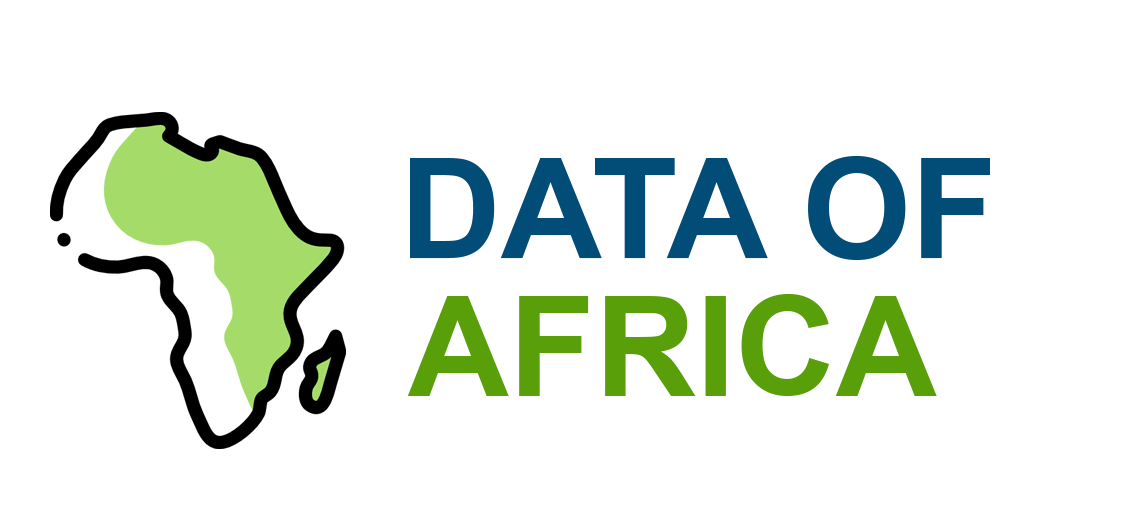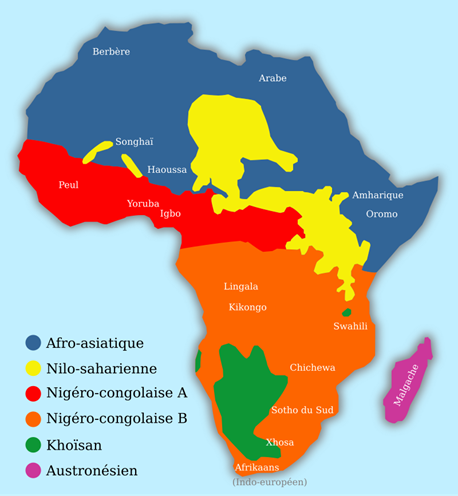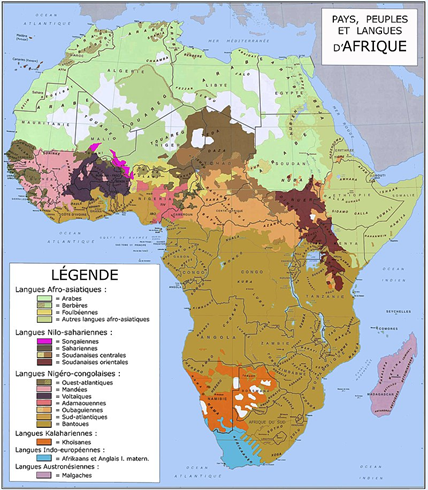Linguists identify around 2,000 living languages on the African continent (around a third of the world’s languages), grouped into four major families, excluding languages of non-African origin.
The Afro-Asiatic (or Hamito-Semitic) family, composed of 366 living languages (299 of which are spoken in Africa, with a total of 411 million speakers), is not exclusively African. It also extends over the Arabian Peninsula and covers only the northern part of West Africa. It includes Berber, the original language of the inhabitants of North Africa, as well as Arabic, which is the first language in Africa in terms of number of speakers.
Simplified map of language families in Africa.
The Nilo-Saharan family (approx. 200 living languages and 31 million speakers) covers part of the Sahara, the upper Nile basin and some highlands of East Africa. It is composed of six, seventeen or twelve language groups, only two of which are located in West Africa: Songhai (Mali, Niger, Burkina Faso, Benin) and Kanuri (Niger, Nigeria, Cameroon and Chad, around the lake of the same name).
A simplified representation of indigenous languages in Africa. Their multiplicity has determined the majority of States to adopt as their official language that of their former colonial power.
The Khoisan family (22 living languages and 360,000 speakers) is the smallest African language family. It is centered on Namibia and Angola, and also extends into Botswana and South Africa. In the past, the Khoisan languages were spoken in most of southern and eastern Africa. They were gradually ousted from many places by Bantu and then European languages.
The Niger-Congo family includes nearly 1,500 living languages, making it the largest language family in the world (22% of the world’s languages and 71% of African languages). It covers most of West Africa and concerns the vast majority of the region’s population. It includes one group, Bantu, which alone covers almost all of sub-equatorial Africa with the exception of the Khoisan area. This family includes the Swahili language (sometimes called Kiswahili).
Many specialists believe that the original home of the Bantu was located south of Benue, on the border of Cameroon and Nigeria. Around 4,000 years ago, the Bantu began a long migration towards Central Africa, probably driven by the aridification of the climate and the development of agriculture and livestock breeding. This expansion took nearly three millennia. The Bantu did not reach the south of the continent until the 16th and 17th centuries BC, fleeing the Maasai from the upper Nile Valley. The many similarities between the Bantu languages as well as their remarkable geographical extension make it a specific linguistic zone very often distinguished from the rest of the Niger-Congo family.
There are other language families present on the continent:
- Austronesian languages, notably Malagasy;
- Indo-European languages, including French, Portuguese, English and Afrikaans.
French currently plays an important role in Africa, serving as a lingua franca or mother tongue (in Gabon, Ivory Coast, Republic of Congo, Democratic Republic of Congo, Cameroon and Benin in particular) in a large number of countries, and its use is intensifying.
Between 1992 and 2002, the number of learners of French in sub-Saharan Africa and the Indian Ocean increased by 60.37%, from 22.337 million to 34.563 million people. A similar trend can be observed in the Maghreb. However, the figures provided by the International Organization of the Francophonie for the Maghreb were combined with those for the Middle East, so an exact count for the Maghreb countries is not possible. Still, an increase from 10.47 million to 18 million learners can be observed for this group, even though French is not an official language (as in Algeria, for example). There are already more French speakers in Africa than in Europe. The African Academy of Languages was created in 2001 to manage this linguistic heritage.

French-speaking Africa
For more information :
- https://fr.wikipedia.org/wiki/Portail:Afrique
- https://en.wikipedia.org/wiki/Africa
- https://africacenter.org/
- https://journals.openedition.org/etudesafricaines/
- https://etudes-africaines.cnrs.fr/
- https://journals.openedition.org/etudesafricaines/
- https://www.afdb.org/fr/documents-publications/economic-perspectives-en-afrique-2024


